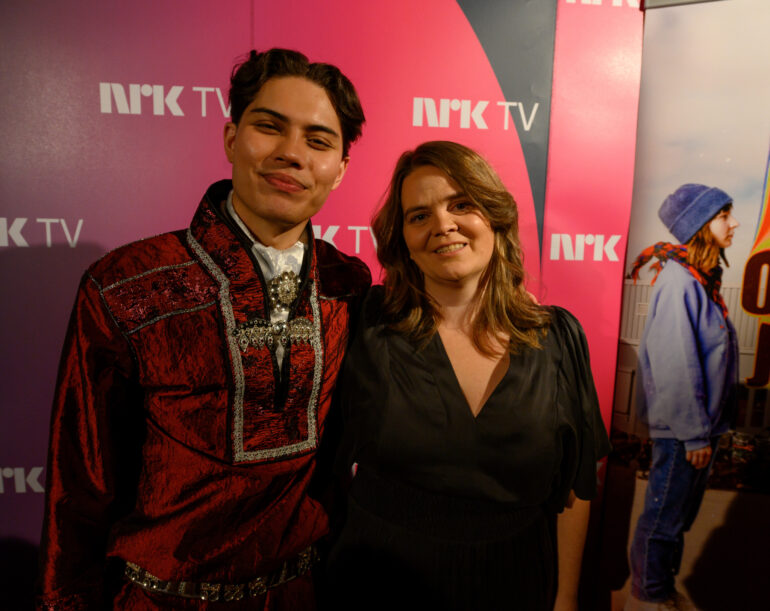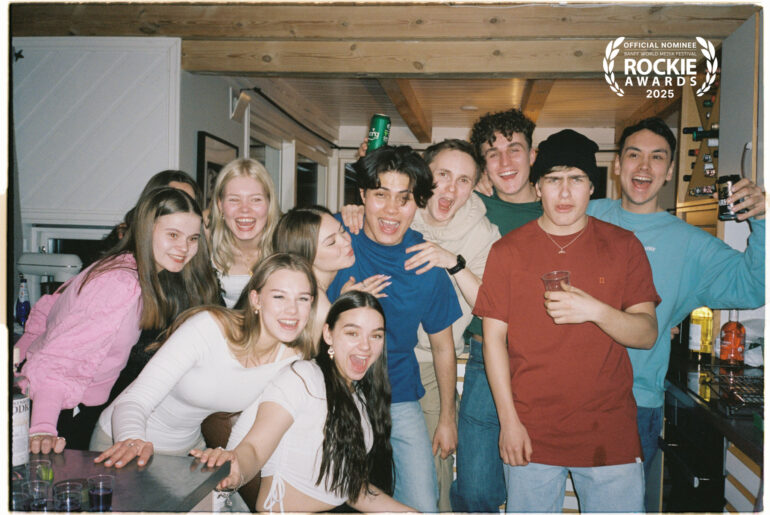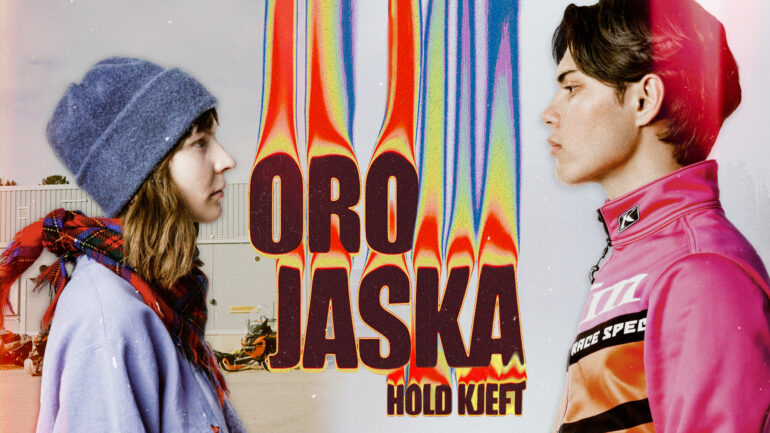WRITTEN BY: Davide Abbatescianni
The series, staged by Alfredfilm for NRK, tackles sensitive and challenging topics such as sexual assault and queer identity with tact and empathy.
Shut Up (Oro Jaska), the groundbreaking Sámi/Norwegian youth series that confronts taboo issues such as sexual assault and queer identity within Indigenous communities, is gaining international recognition. Produced by Alfredfilm for NRK and co-created by Silje Bürgin-Borch and Vegard Bjørsmo, the series was filmed in just 42 days, and premiered on NRK, Yle, and SVT. Set in a small Sámi town in northern Norway, Shut Up follows Elli Anne, whose life is turned upside down after a brutal assault, leading to a tense search for justice that exposes deeply rooted community ties and personal secrets.
The series has been nominated for Best Limited Series at the upcoming Banff World Media Festival’s Rockie Awards. In this interview with Nordisk Film & TV Fond, the creative duo delves into the making of the series, the main production challenges, and the impact of bringing Sámi youth stories to a global audience.
How did the idea come about, and how did it turn into the show we see today?
Silje Burgin-Borch: It all started with NRK in 2018. They reached out to the entire industry, asking for proposals, because they wanted to launch a big initiative: to create the first drama series from the Sámi community. So, we submitted an idea during that call. We wanted to create something meaningful, especially for the young adult audience. At the time, the #MeToo movement was still very active. Within Sápmi, there had also been growing conversations about sexual abuse in small communities — topics that had previously been difficult to discuss openly. We did extensive research, including engaging with the target groups, and found that this topic resonated deeply.
Vegard Bjørsmo: I grew up in the Sámi community in Karasjok, where the series is set. I have a lot of personal, first-hand experience with the topics covered in the series. Those experiences were valuable in the writers’ room. Both Silje and I spent a lot of time in Karasjok, and it really feels like something we created collectively with the community.
SBB: We also conducted eight in-depth, anonymised interviews with Sámi girls and women who had experienced sexual abuse or violence, and are survivors. These interviews provided a roadmap for us in shaping the stories. While the series is fictionalised, it is grounded in real experiences.
In your press notes, you mention “nothing about us, without us” as a guiding principle. Could you elaborate on that?
VB: There were many queer Sámi people involved. In the writers’ room, everyone shared openly. Of course, I shared my own experience, and Katja shared hers as well.
SBB: I’m the only person in the team who isn’t Sámi. This is why “nothing about us without us” was so central. Many Indigenous communities have historically had limited opportunities to tell their own stories. I had to earn the opportunity to be part of it, but it was always clear this had to be a collective effort.
VB: There was a period during production when Silje and I talked a lot because the project attracted many opinions. We also faced external pressure to make the series more palatable to a majority audience. But it was very important for us to stay true to our own voices and to use the internal perspective as our compass.
You spoke about the community involvement. Did you encounter any resistance?
VB: Naturally, this can stir some fear, even within the Sámi community itself. This is the first youth series made by NRK in a very long time focused on Sámi stories. We wanted it to succeed, but it’s also a very honest story.
There was some nervousness about how the series would be received. But overall, we had a lot of support throughout Sápmi. When the series finally aired, people realised it was a high-quality production. During the creation process, we did spend some time trying to reassure people — not so much to calm them, but to earn their trust.
Considering the production itself, Karasjok is a very small town. The whole community had to participate — from lending houses to providing other support. This gave people a strong sense of ownership.
Zooming in on Elli Anne, how did you cast Kátjá Rávdná Broch Einebakken?
SBB: She was actually the script consultant during the writing process. Then, during casting, she came forward as the most suitable choice.
VB: We held open casting calls, but Karasjok is small, and finding fluent Northern Sámi actors is very difficult. Katja was already a trained actor and very capable. Preparing her was challenging, though, because her character’s experiences mirrored her own.
One thing we discussed often, both during and after the shoot, was that while we were working on the scripts, we couldn’t really imagine that we would eventually be playing these characters. Many of the scenes were set in my hometown, and filming meant revisiting some very personal and painful experiences.
SBB: It was a very special situation. Finishing those scripts and then seeing Vegard and Katja on set, in this community where these stories happened, was profound. These real people didn’t just play fictional characters — they created their own stories.
We provided the cast with extra support: a psychologist, an intimacy coordinator, and preparation for scenes depicting sexual violence.
What were the main technical challenges?
VB: Everything had to be brought from Oslo up to Karasjok. We had to plan everything meticulously. For example, the wardrobe department couldn’t just run out and buy something. It was a low-budget production, so we had to look for creative solutions. The authenticity of the setting helped us a lot.
Are you authorised to disclose the budget figure? Would you work on a Season 2?
SBB: It’s publicly known: about 25 million Norwegian kroner. International rights are still available.
VB: If there is a second season, it will be set within the same universe, but the story itself is self-contained and does close at the end.
Read the earlier interview on the NFTVF-supported project with Marianne Furevold-Boland (Head of Drama, NRK), Liisa Holmberg (former Film Commissioner at The International Sámi Film Institute) and Anne Lajla Utsi (ISFI’s Managing Director): CLICK HERE.


